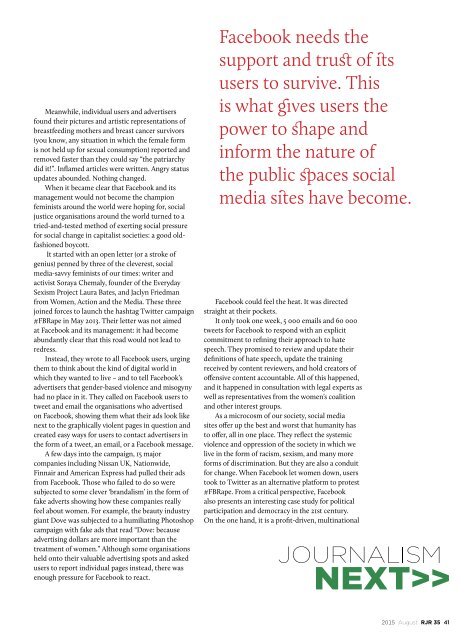Full RJR35
Create successful ePaper yourself
Turn your PDF publications into a flip-book with our unique Google optimized e-Paper software.
corporation that packages user information and<br />
networks and sells this information to advertisers<br />
and developers, effectively exploiting users for hours<br />
of unpaid, immaterial digital labour. On the other<br />
hand, its profits rely on providing an open platform<br />
for the public to share their interests and beliefs.<br />
As their mission statement reads, Facebook is<br />
committed to making the world “more open and<br />
connected”. They seek to provide “a platform where<br />
people can share and surface content, messages<br />
and ideas freely, while still respecting the rights of<br />
others”. This should not be read as a commitment to<br />
creating and sustaining communities or to improving<br />
information rights across the world. It is a business<br />
statement. But it does provide an interesting insight<br />
into the way Facebook necessarily functions: it needs<br />
the support and trust of its users to survive. This is<br />
what gives users the power to shape and inform the<br />
nature of the public spaces social media sites have<br />
become.<br />
The #FBRape campaign is a great example of the<br />
power of global networked feminist participation<br />
in the 21st century, illustrating the emergence of<br />
subversive cultural and political movements and<br />
the creative reconstruction of ICT for social change.<br />
When the initial era of utopian cyber-optimism<br />
about digital democratisation that accompanied<br />
the late 90s and early 2000s explosion of new<br />
information-communication technologies had<br />
passed unfulfilled, critics started to investigate the<br />
other side of the coin.<br />
Rather than democratise communication and<br />
foster robust public debate and free self-expression,<br />
internet spaces seem to have become enclaves for<br />
some of the worst aspects of society; here, racists<br />
and sexists find expression, governments and<br />
corporations can surveil and control their citizens,<br />
and cyber-bullies have taken over the playground.<br />
Debates are polarised and fruitless as keyboard<br />
warriors fight it out from opposite sides of the<br />
screen. Critics also argue that the internet has had<br />
a depoliticising effect on citizens, fragmenting<br />
communities and fuelling rampant narcissism,<br />
flattening the intellectual landscape to a landfill of<br />
personalised news feeds and pictures of cats. While<br />
Rather than democratise<br />
communication and<br />
foster robust public<br />
debate and free selfexpression,<br />
internet spaces<br />
seem to have become<br />
enclaves for<br />
some of the worst<br />
aspects of society.<br />
we have more access to information and networking<br />
power than ever before, the overflow of information<br />
threatens to engulf our political sensibilities until all<br />
we are able to do is click Like and Share.<br />
However, the feminist victory against Facebook<br />
misogyny that is the #FBRape campaign carries an<br />
important message for anyone working, playing,<br />
and living on the internet. The internet is a complex<br />
series of locations that dynamically embodies new<br />
models of citizenship and political activism. #FBRape<br />
is a great example of how people are interacting with<br />
new technologiesas citizen-activists. By subverting<br />
the logic of capital and putting it to work towards<br />
social justice ends, thousands of citizens spoke back<br />
to corporate power and systemic misogyny, getting<br />
one step closer to creating the kind of internet we all<br />
want to live in.<br />
Kayla Roux lectures<br />
in digital media at<br />
the Rhodes University<br />
School of Journalism.<br />
She is currently<br />
studying towards<br />
her Ma degree with<br />
a focus on the role<br />
of the internet in<br />
feminist activism.<br />
k.roux@ru.ac.za<br />
42 RJR 35 August 2015


